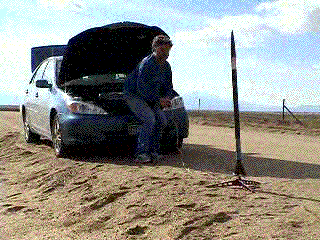Scratch Gunslinger Original Design / Scratch Built
Scratch - Gunslinger {Scratch}
Contributed by Jeff Lane
| Manufacturer: | Scratch |
Brief:
Tall scratch mid power rocket.

Construction:
Materials: Magnum nose cone, 3 BT-60 tubes, 2 couplers, 3/32" birch
plywood, 29mm engine tube, 36" quarter-inch elastic shock cord, 21"
mylar parachute.
Sometime ago I found a 2-pack of Aerotech F23-7 Econojet single use motors for $12.95 on clearance at Hobby Lobby so I snapped 'em up. The last time I launched an F engine was back in the 1970s with a big ol' black powder FSI engine when those were the biggest engines available for model rocketry. My how things have changed!
It was time to increment up to bigger engines and get up to speed with current rocketry thinking, so this model represents several firsts for me including my first RockSim design, first composite propellant engine use, first through-the-wall fin mount, and first rocket with plywood fins. I also used two building and flying tips from the EMRR database which were new to me.
The first iteration of this rocket was bigger and taller than what's shown in the photo. It had 18 inches of BT-80 aft, a paper transition, and 3 sections of 18-inch BT-60 on top. With the long nose cone and fin sweep it was over 6 feet tall. Unfortunately the first launch on 4/14/05 was a CATO on an E9-4. The entire fin section was toast along with a portion of the upper BT-60 section.
I wound up with 39.125 inches of body tube topped off by the long, sleek 8.375 inch plastic nose cone originally from an Estes Magnum. With the fins sweeping back a little less than half an inch, the total length is 4 feet.
It's a pretty simple build. The BT-60s were glued together with couplers, the fins were cut out with a razor saw, the slots for the fins were cut with a hobby knife, and the engine tube/block/ribs/centering ring unit was glued in place with Elmer's followed by the fins. I love having the fins glued to the engine tube and the body tube. It results in a much more sturdy assembly. The 3/16" launch lug was offset .25" in case I want to add a payload in the future.
Finishing:
After a couple coats of high build Autozone primer, I finished it with Maserati
gunmetal gray metallic automotive paint, some self-adhesive reflective
holographic mylar, and a custom Lazertran waterslide decal/body wrap.

Flight:
Rocksim predicts almost 2300 feet on an F23 and both F flights certainly looked
that high. Even though it's a tall rocket, it's got a small profile, so it's
hard to see at that altitude. The engine tube is long enough for G Econojets,
but they don't make a long enough delay (it needs 9 seconds). I'll eventually
try an E9-6, D12-5, and even a C6-3.
Other than the CATO, there were no gotchas. Prep is easy, engine is friction fit (even though it's composite and heats up a lot, it works fine), and there's plenty of room for the parachute and wadding, so everything ejects well.
The second launch (with the shorter configuration) was on an F engine on an open range south of Ellicott, Colorado. You can see Pikes Peak in the background of the animated .GIF file. The black smoke, altitude, and quickness off the pad were most impressive. As far away as it was, the ejection charge was still a loud pop. A couple of shroud lines broke but there was no damage to the rocket. Third launch was at C.R.A.S.H. on 5/21/05. It had a barely discernable corkscrew, but the mylar chute held up and it was a perfect flight.
Recovery:
I used 1/4" elastic shock cord with paper mount, which works fine. First
functional flight was with a 18 inch parachute and the second flight was with a
20 inch mylar chute, which was too big.
Summary:
This is a sleek, pointy, small-finned rocket that has people concerned about
its stability until it disappears off the pad.
Other:
The two EMRR tips used: paint the tip of the nosecone using a paper centering ring as a mask and split the end of a Copperhead igniter with a flame to use mini clips. Both techniques work great.
Sponsored Ads
 |
 |











